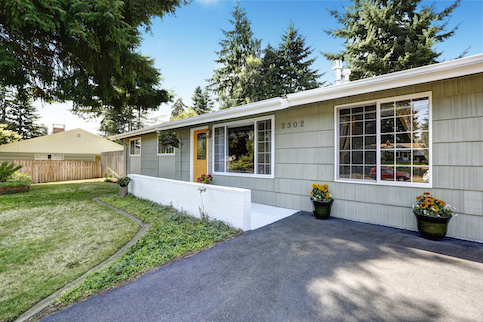Home buyers in the late stages of their home purchase may learn their title search has turned up an encumbrance. This can jeopardize the home sale, leaving you and the seller frustrated, with nothing to show for weeks or months of hard work and negotiation. Read on to learn what an encumbrance is, the different types you might encounter, and how to handle them.
Key Takeaways:
- An encumbrance is a legal claim of ownership against a property.
- Encumbrances can be financial or legal and come in many forms, including easements, liens and encroachments.
- Some encumbrances can jeopardize a home sale or reduce a home’s value, while others have little effect.
What Is An Encumbrance?
An encumbrance is an outside claim against a property that affects how the owner can use their own home or land. Home buyers often run into encumbrances during a title search, one of the last steps to buying a home. An encumbrance can delay or derail your closing at the last minute because it affects the seller’s ability to transfer the property. This is why title insurance, which protects home buyers and lenders from damages or financial losses arising from title issues, is a good idea.
Generally, an encumbrance also affects a home buyer’s ability – or desire – to purchase a property and should be resolved before the transaction is completed. Encumbrances do not always affect a property’s value, but they might sometimes require legal action to resolve.
What’s Your Goal?
Buy A Home
Discover mortgage options that fit your unique financial needs.

Refinance
Refinance your mortgage to have more money for what matters.
Tap Into Equity
Use your home’s equity and unlock cash to achieve your goals.
Types Of Encumbrances In Real Estate
There are a few different types of encumbrances, but they can generally be split into two categories: legal and financial.
Financial encumbrances are usually liens. These are debts secured by or held against the property. A mortgage is an example of a lien.
Legal encumbrances, by contrast, are restrictions on the use of a property, often due to environmental regulations or zoning laws.
Other encumbrances include easements, deed restrictions, encroachments and leases.
Here are details on common types of encumbrances:
Easements
An easement grants limited property usage to an entity other than the owner.
For example, imagine two homes, one close to the street and one behind the first, farther from the street. One long driveway connects both houses to the street. The owner of the farther home likely has an easement on the property closer to the street, giving them the right to use the driveway to drive to and from their own house. Though they don’t technically own the land on which the driveway is located, they have the right to use it because of the encumbrance.
Easements can be affirmative, negative or easements in gross:
- Affirmative easements give the easement holder the right to do something, such as drive on a road that’s on the property owner’s land.
- Negative easements give the easement holder the right to block the property owner from doing something. For example, a negative easement holder could prevent a property owner from building a tall structure that would block too much sunlight.
- Easements in gross are similar to other easements but are tied to a specific person rather than a property, meaning it does not become part of the property’s title or transfer from owner to owner. If a property owner sells an easement in gross to another party and later sells their property, the new owner is not required to honor that easement in gross.
Remember that while easements may allow another party to use the property, the owner retains the title.
Encroachments
An encroachment occurs when someone else – usually a neighbor – has a structure or plant sitting partially or entirely on your property. For example, a neighbor’s fence that strays into your property can cause an encumbrance.
It’s crucial to address encroachments even if the issue doesn’t bother you. An unaddressed encroachment can eventually lead to a claim of adverse possession that gives ownership rights to the neighbor. Fortunately, a written agreement asserting your property right and consenting to your neighbor’s use of the property can often help avoid the problem escalating and ending up in court.
Liens
A lien is a legal claim that gives an entity the right to take possession of an asset – in this case, a house – under specific circumstances, such as an unpaid debt. Liens limit a homeowner’s sale of their property.
Mortgage Liens
The primary example of this is a mortgage lien. When a person takes out a mortgage, their home is used as collateral, and the lender will have a lien on the property until the mortgage is paid off. This applies if you’ve taken out additional home loans, like a home equity loan, HELOC or second mortgage.
The lien is for the lender’s security. If the homeowner defaults on the loan, the lien allows the lender to repossess the property. At closing, the seller must resolve the lien (though this typically isn’t an issue because they can pay the mortgage off using proceeds from the sale). Otherwise, lienholders have the right to stop the transaction until the owner satisfies outstanding debts.
Tax Liens
If you fail to pay income or property taxes, the IRS, state or local government will put a tax lien on your property. A lien due to unpaid property taxes takes precedence over all other creditors and can result in foreclosure, with both you and your lender losing the property – even if you have kept up with your mortgage. Most lenders require borrowers to pay their property taxes as part of their monthly mortgage payment along with their homeowners insurance premiums – both of which go into escrow accounts that lenders manage – to avoid this issue.
Mechanic’s Liens
A professional who repairs your car, home or property can place a mechanic’s lien on your home until you pay them for their services. If this lien is somehow not paid when the owner sells the home, it stays with the property even after a transfer of homeownership, which can make selling the home more difficult.
Leases
Leases can also be a type of encumbrance because they give a party the right to use the property, usually by occupying it, for a specific amount of time. If someone buys a property that is leased out, they’ll typically have to continue allowing the tenant to use the property until the lease expires.
Covenants, Conditions And Restrictions
If you buy a home located within a homeowners association, you will have limits placed on your use of the property. These stipulations are known as covenants, conditions and restrictions, or CC&Rs. CC&Rs are typically part of the deed, so homeowners cannot ignore them. As a result, failure to comply with CC&R and pay required fees or fines can lead to your HOA placing a lien on your home.
HOA rules can restrict a homeowner’s choices in various ways. For example, your CC&R may prevent you from roofing your house with a specific material or painting your house a particular color. Furthermore, some HOAs may limit the number or kind of pets you can keep in the home.
Zoning
Zoning laws are municipal regulations that define what a property can be used for. For example, zoning laws may help ensure that a shopping mall doesn’t go up in the middle of a neighborhood or that your next-door neighbor doesn’t decide to build a large apartment building on their property. Thus zoning laws can limit what changes or updates owners can make to their property.
Claims Against A Title
A title search can reveal pending lawsuits that seek a claim to a property, like a prescriptive easement, an encroachment or other claims against the property. If your title search unearths claims against the title of the home you’d like to purchase, you’ll need to work with the seller and claimants to resolve them.
Ready To Become A Homeowner?
Get matched with a lender that can help you find the right mortgage.
Are Encumbrances A Problem?
Encumbrances might sound intimidating, but almost all property in the U.S. is encumbered in some way. For example, easements allow public services like police, fire and utilities access to perform their duties or make necessary repairs to your home.
Additionally, anyone with a mortgage technically has an encumbrance in the form of a lien against their home. However, the encumbrance isn’t a problem unless the homeowner fails to pay their mortgage or sells their home for significantly less than their remaining loan balance, which is rare.
Because encumbrances can have wide-ranging effects on property, home buyers and homeowners need to understand how an encumbrance affects the property and decide whether they can live with those restrictions. If your home or the home you want to buy has encumbrances, it’s a good idea to consult a real estate attorney to review the details.
How Do Encumbrances Affect Real Estate Transactions?
Encumbrances can have a significant effect on real estate transactions or little to no impact at all. It all depends on the type of encumbrance and the intentions of the people involved in the transaction.
Encumbrances “affect purchase transactions because the buyer must be informed of the encumbrance, and then has to decide whether to accept the encumbrance and move forward, whether to demand the encumbrance be removed and move forward, or whether to walk away,” says Casey Fleming, author of Buying and Financing Your New Home (2023) and mortgage advisor with Silicon Valley Mortgage.
While a mortgage lien may be easy to handle, if the encumbrance is hundreds of thousands of dollars in unpaid property taxes or a mechanic’s lien, it could be more of a deal breaker.
Financial encumbrances also make it all but impossible for prospective home buyers to get a mortgage, even if they’re willing to accept the encumbered property.
“If a lender sees a lien, they won’t close the mortgage until that lien is removed, except for second mortgages, which will allow a senior mortgage but no other liens,” says Fleming.
Take The First Step To Buying A Home
Find a lender that will work with your unique financial situation.
Can You Get Rid Of An Encumbrance On Real Estate?
Yes, it is possible to get rid of an encumbrance. In some cases, it’s easy, but in others, it can be tricky.
For example, if the encumbrance is from an old mortgage or lien that you’ve already paid off, you may be able to resolve it by simply sending a letter to the person or entity that placed the lien, asking them to remove it. An encumbrance such as encroachment might be resolved by neighborly negotiation or a written agreement.
Other encumbrances can be much more complex. For example, if you want to remove an easement, you might have to resort to legal action if it has no expiration date and the easement holder refuses to give up their right to use your property.
FAQ
Here are answers to common questions about encumbrances:
The Bottom Line
Encumbrances in real estate grant rights to other parties besides the property’s owner. They can arise from neighbors keeping objects on the owner’s property or guaranteeing creditors the right to a home until specific debts are repaid. Therefore it’s wise to understand any encumbrances on the home you’d like to buy before completing the transaction.
Preferences and circumstances vary, so everyone should evaluate whether the encumbrances are significant enough to make them walk away from purchasing the property. Some encumbrances don’t impact a homeowner’s daily life, while others can create pressing legal ramifications if left unresolved.
More From Quicken Loans:
- Can You Sell A House With A Mortgage?
- What Is A Title Insurance Claim And How Do You Make One?
- Buying Tax Lien Properties And Homes
- Clouds, Claims And Defects: The Many Names For The Title Problems That Can Delay Your Closing
- House And Property Deeds: A Home Buyer’s Guide
- Restrictive Covenants: How They Affect Your Property
Ashley Kilroy contributed to the reporting of this article.

T.J. Porter
T.J. Porter is a Boston-based writer who focuses on credit cards, credit and bank accounts. When he's not writing about all things personal finance, he enjoys cooking, esports, soccer, hockey, and games of the video and board varieties.












